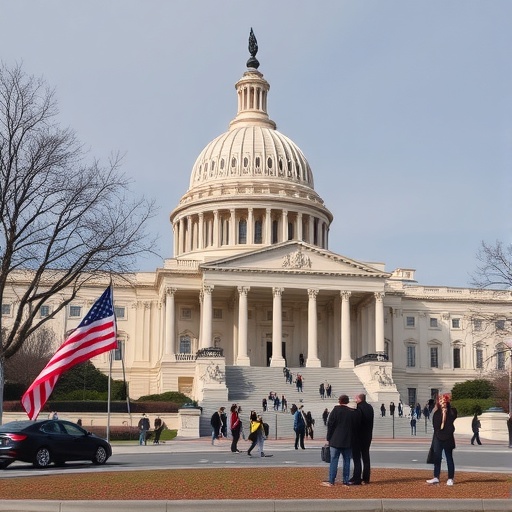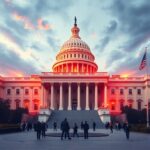US Government Shutdown Extends as Congress Deadlocks on Healthcare subsidies for Millions
In a bitter standoff that’s left federal agencies in limbo, the U.S. government shutdown has stretched into its 15th day, with Democrats and Republicans in Congress unable to bridge a widening gap over Healthcare subsidies that affect millions of Americans. As the December holidays approach, the impasse threatens to disrupt everything from family gatherings to essential public services, amplifying the human cost of partisan gridlock.
- Federal Workers Brace for Prolonged Uncertainty in Shutdown Fallout
- Democrats Rally Behind Subsidy Extensions to Shield Vulnerable Families
- Republicans Draw Hard Lines on Spending Amid Fiscal Concerns
- Public Services Teeter on the Brink as Shutdown Impacts Mount
- Bipartisan Breakthrough Eludes Lawmakers as Holidays Heighten Stakes
The core dispute revolves around the extension of Affordable Care Act (ACA) subsidies, which provide financial relief to low- and middle-income families purchasing health insurance on federal marketplaces. Without these subsidies, premiums could skyrocket by an average of 75% next year, according to estimates from the Congressional Budget Office (CBO). Democrats argue that failing to renew them would devastate working-class households, while Republicans demand deeper spending cuts elsewhere to offset the costs, framing it as a matter of fiscal discipline.
This isn’t just a Washington squabble—it’s a crisis rippling through communities nationwide. Over 800,000 federal workers are furloughed or working without pay, and the shutdown’s economic toll is already pegged at $1.5 billion per week by the U.S. Travel Association. As negotiators huddle behind closed doors, the pressure mounts for a breakthrough, but with both sides digging in, resolution feels increasingly elusive.
Federal Workers Brace for Prolonged Uncertainty in Shutdown Fallout
For federal employees like Sarah Jenkins, a National Park Service ranger in Virginia, the government shutdown has turned everyday life into a financial tightrope. “I’ve got bills piling up, and my kids are asking why Santa might not come this year,” Jenkins shared in an interview with local media. She’s one of thousands facing delayed paychecks, forced to dip into savings or rely on food banks just to make ends meet.
The shutdown, triggered on December 1 after Congress failed to pass a funding bill, stems directly from the Healthcare subsidies debate. House Speaker Mike Johnson (R-La.) has blocked a bipartisan deal unless it includes concessions on ACA enhancements, while Senate Majority Leader Chuck Schumer (D-N.Y.) accuses Republicans of holding the economy hostage. “This is about people’s lives, not political points,” Schumer declared during a fiery floor speech last week.
Statistics paint a grim picture: The Partnership for Public Service reports that 2.6 million civilian federal workers could be impacted, with 40% already experiencing service disruptions. In the Department of Veterans Affairs, for instance, non-essential staff have been sent home, delaying routine medical appointments for thousands of veterans. Meanwhile, the IRS has halted processing of tax refunds, exacerbating holiday-season woes for families.
Economists warn of broader ripple effects. A Moody’s Analytics study projects that if the shutdown lasts through Christmas, it could shave 0.2 percentage points off fourth-quarter GDP growth. Small businesses near federal installations, from D.C. delis to Yosemite gift shops, are reporting 30-50% revenue drops as tourists stay away. “We’re barely hanging on,” said Tom Rivera, owner of a cafe near the Pentagon. “This shutdown isn’t just federal—it’s killing local dreams.”
Democrats Rally Behind Subsidy Extensions to Shield Vulnerable Families
At the heart of the Congressional deadlock are the enhanced healthcare subsidies introduced during the COVID-19 pandemic, which cap premium costs at 8.5% of household income for many enrollees. Set to expire at year’s end, these provisions have enrolled over 21 million Americans in marketplace plans, per Centers for Medicare & Medicaid Services data— a 40% increase since 2020.
Democrats, led by figures like Rep. Pramila Jayapal (D-Wash.), are framing the fight as a moral imperative. “Letting these subsidies lapse would be a death sentence for affordable care,” Jayapal said in a recent op-ed. Her Progressive Caucus has mobilized, circulating petitions with over 500,000 signatures urging swift renewal. They point to real-world stories, like that of Maria Gonzalez, a single mother in Texas whose insulin costs dropped from $300 to $35 monthly thanks to the subsidies.
Yet, the political calculus is complex. Polling from Kaiser Family Foundation shows 62% of Americans support extending the subsidies, but only 45% blame Republicans for the shutdown— a slight edge that Democrats are leveraging in campaign ads. In the Senate, a procedural vote last Tuesday failed 51-49 along party lines, with all Republicans opposing a clean extension bill. “We’re not against help for the needy,” countered Sen. Lindsey Graham (R-S.C.), “but we can’t keep borrowing from our grandchildren’s future.”
Advocacy groups are amplifying the urgency. AARP has launched a nationwide ad campaign highlighting how seniors on fixed incomes rely on these subsidies, while the American Hospital Association warns of increased uncompensated care if coverage gaps widen. In urban centers like Chicago and rural areas in Appalachia, community health clinics report a surge in inquiries about alternative options, underscoring the subsidies’ role as a lifeline.
Republicans Draw Hard Lines on Spending Amid Fiscal Concerns
Republicans in Congress are countering with a narrative of restraint, insisting that any healthcare subsidies extension must be paired with offsets like reduced funding for green energy initiatives or immigration enforcement reforms. House Majority Leader Steve Scalise (R-La.) articulated this stance in a press conference: “We’re committed to protecting taxpayers, not expanding a bloated bureaucracy that drives up deficits.”
The GOP’s position is bolstered by internal unity, with only a handful of moderates like Sen. Susan Collins (R-Maine) expressing openness to compromise. Fiscal hawks, including the House Freedom Caucus, have drafted alternative bills that tie subsidies to work requirements, a move decried by Democrats as punitive. CBO projections estimate the full extension would cost $250 billion over a decade, a figure Republicans decry as unsustainable amid the nation’s $34 trillion debt.
Behind the rhetoric, there’s evident frustration. Anonymous sources from GOP leadership reveal closed-door tensions, with some members worried about voter backlash in swing districts. A recent Quinnipiac poll shows Republican approval ratings dipping to 38% on handling the shutdown, compared to 45% for Democrats. Still, party leaders like Senate Minority Leader Mitch McConnell (R-Ky.) remain steadfast, blocking multiple Democratic motions and vowing no deal without concessions.
The shutdown’s origins trace back to a routine appropriations process derailed by this flashpoint. In September, a temporary funding measure passed with bipartisan support, but the December CR (continuing resolution) became a battleground when Republicans attached riders targeting ACA provisions. Now, with the House and Senate at odds, Speaker Johnson faces mounting pressure from his caucus to hold firm—or risk a revolt.
Public Services Teeter on the Brink as Shutdown Impacts Mount
Beyond federal paychecks, the government shutdown is straining the nation’s infrastructure. National parks, closed since Day 1, have lost an estimated $200 million in visitor spending, per the National Parks Conservation Association. Iconic sites like the Grand Canyon and Statue of Liberty stand eerily quiet, with rangers like Jenkins reassigned to bare-bones operations.
Air travel is another casualty. The Federal Aviation Administration reports delays averaging 20 minutes at major hubs due to reduced staffing, while TSA screeners—deemed essential—work without pay, leading to protests at airports from LaGuardia to LAX. “We’re patriots, not pawns,” read a sign held by furloughed Customs and Border Protection officers picketing in San Diego.
Healthcare ripples are particularly acute. With the Centers for Disease Control and Prevention operating at minimal capacity, flu season monitoring has been curtailed, raising fears of undetected outbreaks. The National Institutes of Health has paused non-emergency clinical trials, affecting cancer patients and others in treatment. “This shutdown isn’t abstract—it’s delaying cures,” said Dr. Elena Vasquez, a researcher at NIH.
Food safety inspections by the FDA have dropped 30%, per agency memos, heightening risks for imported goods. Social services, including Head Start programs for low-income children, face interruptions, with 900,000 kids potentially losing access by mid-January. In a stark illustration, a Virginia food pantry reported a 25% uptick in federal worker clients last week.
State governments are stepping in where they can—California Governor Gavin Newsom announced emergency loans for affected workers—but it’s a patchwork solution. The U.S. Conference of Mayors estimates urban areas could see $500 million in lost economic activity weekly, from shuttered museums to canceled federal grants for infrastructure.
Bipartisan Breakthrough Eludes Lawmakers as Holidays Heighten Stakes
As Thanksgiving fades and Christmas nears, the government shutdown looms over holiday plans, with families weighing travel risks and gift budgets. White House Press Secretary Karine Jean-Pierre urged Congress to act, stating, “The American people deserve better than this manufactured crisis.” President Biden, in a Rose Garden address, called for “common-sense compromise” on healthcare subsidies, hinting at potential vetoes for any bill laden with partisan add-ons.
Negotiations continue in fits and starts. A working group of 12 lawmakers—six Democrats and six Republicans—met virtually yesterday, but sources say progress is minimal. House Democrats have proposed a $100 billion offset package targeting defense efficiencies, but Republicans dismissed it as insufficient. Meanwhile, third-party mediators like the Bipartisan Policy Center suggest a short-term extension to reopen government, allowing more time for subsidy talks.
Looking ahead, the stakes couldn’t be higher. If unresolved by December 20, the Treasury Department warns of cash flow issues that could force delayed Social Security payments—affecting 70 million recipients. Market analysts predict volatility, with stock futures dipping 1.5% on shutdown fears. Internationally, allies like the EU express concern over U.S. reliability, potentially impacting trade deals.
For everyday Americans, the path forward hinges on political will. Grassroots movements, from #EndTheShutdown rallies in D.C. to online petitions, are pressuring lawmakers. As one anonymous Senate aide put it, “Yuletide cheer won’t fix this, but voter anger just might.” With midterms on the horizon and public frustration boiling, the coming days could force a deal—or deepen the divide, leaving millions to navigate an uncertain new year without vital healthcare subsidies.








